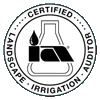Overwatering the problem and solution
The Problem: Too Much Water
Overwatering can have some serious consequences for your landscape. First, it can cause the roots of your plants to rot, which will kill them. Overwatering can cause your lawn to become very wet and muddy, which will make it difficult for it to breathe. This can lead to the grass dying.
Are you overwatering? here are some things to look for:
• Check the soil. If it’s always wet or muddy, you’re probably watering too much.
• Look at your plants. Are they wilting, even though it’s not hot outside? This could be a sign that they’re not getting enough air because of all the water. Are the leaves turning yellow? Yellow leaves can either mean overwatering or underwatering. If you have potted plants, check for drainage or for self-watering container plants open the overflow mechanism. Another telltale sign of overwatering is mushrooms growing on your lawn.
• Check your water bill. If it’s higher than usual, you might be overwatering without realizing it.
What causes overwatering?
Too much rain. Plant roots need air to survive and flourish. When there is too much water in the soil due to heavy rainfall, plant roots do not receive the air they need to grow. A typical result of this is that plants begin to turn yellow, drop leaves, wither, and die. Lawns will typically show spotty areas of dead grass.
Irrigation system watering too long or too often.
Your rain sensor may not be working. Hopefully you have one. That way if it rains, your sprinklers will automatically shut off.
Uneven watering among zones. This can be caused by clogged or broken sprinkler heads.
The Solution:
Water less often. You might also want to water it for a shorter amount of time.
Make sure you’re using the right amount of water. You don’t want to be watering your lawn for hours on end, because that will just waste water and not do anything good for your lawn. Consider getting a WIFI controller which connects to your local weather forecast and automatically adjusts your watering schedule to make sure your landscape gets the right amount of water at the right time in each zone.
Make sure that you’re watering evenly. If one area of your lawn is getting too much water, while another is being neglected, that can lead to problems. If you have an automatic sprinkler system, adjust the zones on your controller to reduce the time spent irrigating the problem area.
Check your sprinklers to make sure they’re working properly. Clogged or broken sprinkler heads can cause uneven watering, which can, in turn, lead to overwatering.







